May 22, 2025 | 15:17 GMT +7
May 22, 2025 | 15:17 GMT +7
Hotline: 0913.378.918
May 22, 2025 | 15:17 GMT +7
Hotline: 0913.378.918
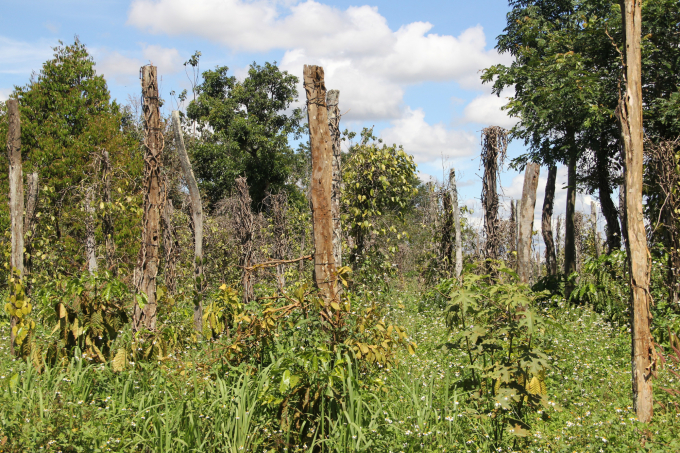
The “capital of pepper” is now the “graveyard of pepper”. Photo: Minh Quy.
Some years ago Nam N'Jang commune, Dak Song district, Dak Nong province was still often referred to by many beautiful names: “the commune of billionaires”; “Central Highlands’ capital of pepper”, “the village of giants”, “the villa village”, “the richest in Dak Nong”. Nature blessed Nam N'Jang with the most fertile and lush basalt red land in the whole Central Highlands region.
But in the next few years, those beautiful phrases no longer existed. Some people called Nam N'Jang by a deadly name: the “graveyard of pepper”. From Highway 14 to the center of the commune, the thousands of hills remained there, still the pepper gardens as wide as the eye can see near the spacious villas as if to show off the wealth of a distant past. The only thing is that the pepper gardens were all sick if not dead. The trees were yellowly withered, and the villas are abandoned whose owners’ location was unknown.
The Vice Chairman of Nam N'Jang commune gave us a brief on the situation: "Getting rich from pepper, building houses and buying cars comes from pepper but falling into debt, having a foreclosure, leaving homeland also comes from pepper. In the past few years, the death of pepper pillars has made people fall into depression. The causes are many, but the main problem lies in the abusive use of inputs such as chemical fertilizers and pesticides. The land is severely poisoned, resulting in the plants quickly dying one after another. The whole commune has nearly 3,000 ha of pepper, but in just two years, 2017 and 2018, we lose 326 ha."

Former pepper growers in Nam N'Jang are now "fleeing". Photo: Minh Quy.
Once there was an investigation by the Center for Pesticide Testing and Inspection, showing that pepper farmers used up to 28 active ingredients to control pests on pepper plants, three of which were active ingredients banned from the permitted list. The richer they became, the more fertilizers and pesticides they used. The “capital of pepper” soon became a charming prey for the input trading business. Merchants risked their all for profits, mixing real and fake products altogether and creating a mess in the market.
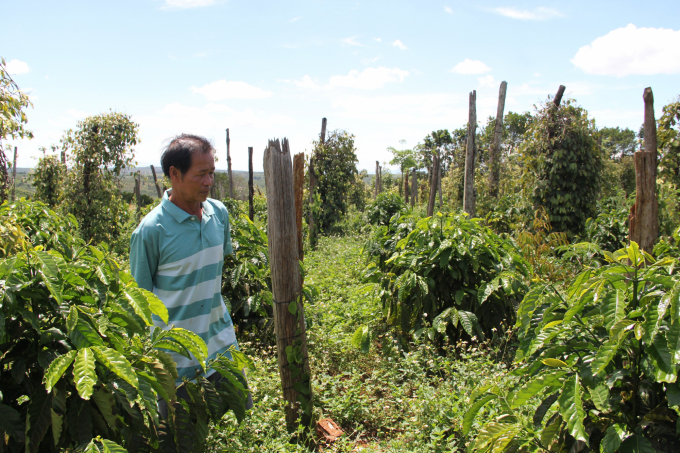
“The fertilizers and pesticides here all ‘do’ drugs!” - said Mr. Le Van Tinh, an elder farmer in Nam N'Jang. Photo: Minh Quy.
But according to Mr. Pham Quang Nam, Vice Chairman of Nam N'Jang People's Committee, pepper was a very strange plant. They must be fed with chemical fertilizers and pesticides to sustain themselves. Each year 1 ha of pepper was sprayed in two sessions, and each session used approximately 1,000 l of pesticides mixed with water. “Just the money for fertilizers and pesticides already costs hundreds of millions of dong. Many families are willing to invest even billions for these inputs.”
It was not until thousands of hectares of pepper died at the same time that people in the capital of pepper realized the cause: too much chemical fertilizer and pesticide had been used. “No matter how good the land was, such exploitative production is unbearable.”
When asked about whether they would continue farming pepper Elder farmer Le Van Tinh, one of the few pepper growers who remained in Nam N'Jang after these events, said, “I only have nearly 1 ha of pepper left. I don’t even have the money to invest. The land here seems beyond saving. It can’t go back to the old days anymore.”
After these events which result in heavy consequences from a long period of land poisoning and exploitation, a number of clean, organic and sustainable pepper production link models began to form in Nam N’Jang in recent times. But it may take many more years for the dead soil to show any hope of recovery.
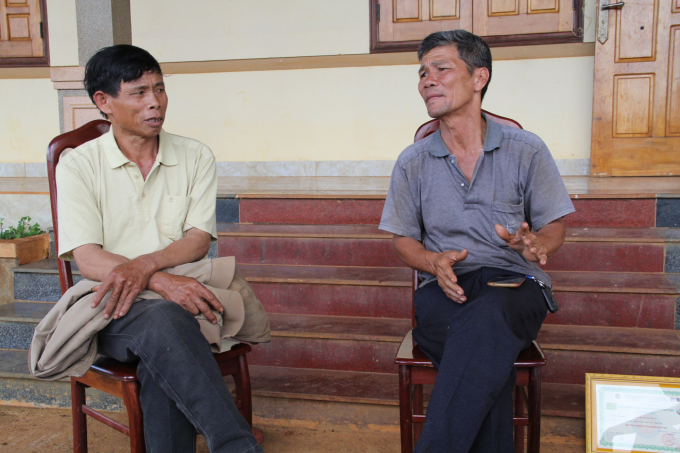
Pioneer farmers of Nam N’Jang. Photo: Minh Quy.
It took Mr. Dao Van Tinh, Chairman of Nam N'Jang Commune Farmers' Association, great effort to lead us to some farmers who are growing organic pepper in the commune. Because, as Mr. Tinh said, the pepper capital had just established cooperatives in recent years. Businesses also came to join hands with farmers to implement clean pepper models, but the results seemed meager. The effectiveness was mainly on paper.
Perhaps that is also the reason that the whole Nam N'Jang commune has thousands of pepper growing households, but now there are only four farmers persisting with the clean pepper model. They are Mr. Nguyen Thanh Trung, Nguyen Thanh Phuoc, Ho Sy Hoa, and Nguyen Van Sau. They are also the ones who still have the most pepper growing areas here. Each of them owns approximately 10 ha associated with Son Ha Spices Co., Ltd. to grow clean pepper.
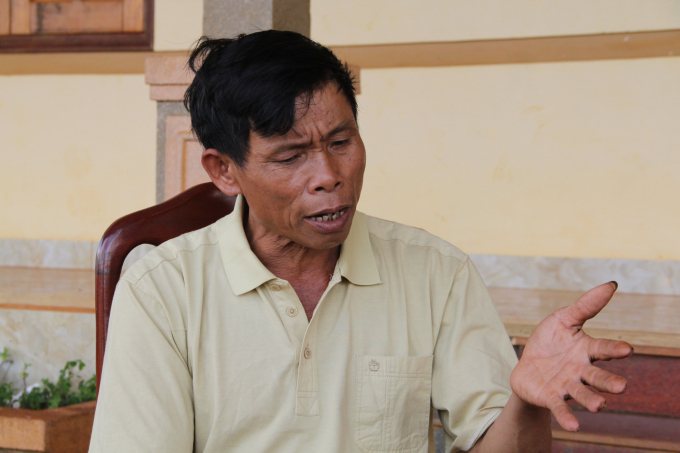
“We decide to change because we also know how to be afraid.” Photo: Hoang Anh.
“We know it’s extremely hard to change the common farming habits, methods and practices, sacrificing immediate benefits, but there was really no other way. From 6-7 years ago, my brother and I decided to switch to organic pepper cultivation. The first few years were complete failures because the soil fail to meet standard requirements, but in recent years we have harvested some initial success. Everyone has attained an ecological farmer household certificate. Each crop helps us gain several billion VND," said farmer Ho Sy Hoa, a native of Nghe An who has been to Nam N'Jang since 1995.
Translated by Samuel Pham
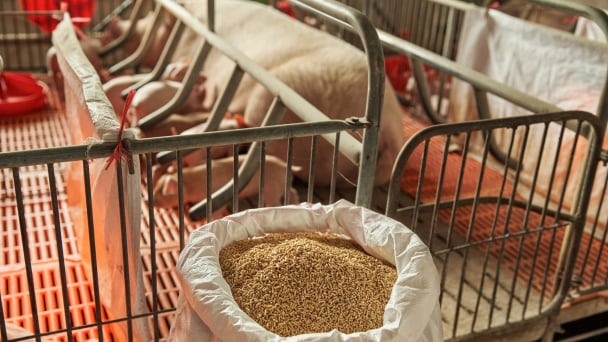
(VAN) CJ Feed&Care officially launched the FCR improvement campaign called “2025 Find Challenge Reach” in April 2025. In Vietnam, this campaign is implemented by CJ Vina Agri.
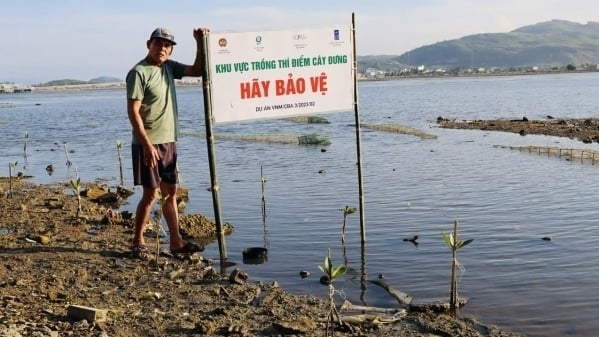
(VAN) The swamp in Pho Thanh is gradually being covered with red mangrove, creating a favorable environment for producing clean, high-quality salt.

(VAN) The trade turnover of agro-forestry-fishery products is growing significantly, along with investment cooperation commitments that are opening up new development directions between Vietnam and Russia.

(VAN) Khanh Hoa is investing over 545 billion VND to develop 240 hectares of high-tech marine aquaculture in order to guarantee a consistent supply of seafood exports and achieve the USD 1 billion target.

(VAN) Minister of Agriculture and Environment Do Duc Duy held a meeting with Soopakij Chearavanont, Chairman of C.P. Group, on May 15.
/2025/05/16/3800-0-nongnghiep-143756.jpg)
(VAN) Suntory PepsiCo Vietnam coordinated with the Ministry of Education and Training to implement an education program on water conservation, reaching nearly 1 million primary school students nationwide.

(VAN) Vietnam’s TH Group officially put its high-tech fresh milk processing plant into operation in the Russian Federation, marking a historic moment as the first TH true MILK cartons were produced in Russia.